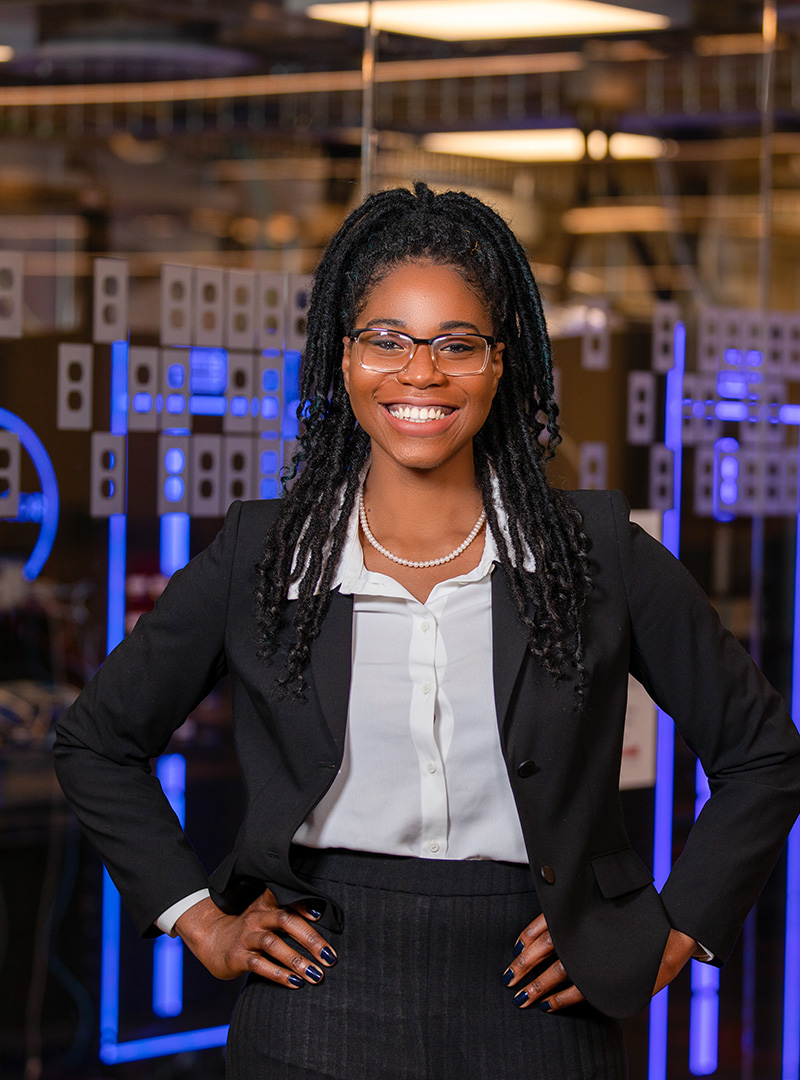

After a childhood spent with limited access to the power grid, this alumna works to ensure a steady supply for others.

Taiwo Ninalowo ’12 recalls the darkness, the anxious moments awaiting light’s return, and the 90-degree nights that made sleeping a task of its own.
She remembers completing schoolwork next to a kerosene lantern and the symphonic grumbling of diesel generators.
That was life for Ninalowo growing up in Lagos, Nigeria, as one of nine children that neighbors referred to as “the soccer team.”
Though her 11-member family inhabited an economic reality better than most – Ninalowo’s father owned a car dealership while her mother plied numerous entrepreneurial skills, a seamstress and hairdresser among them – reliable electricity remained elusive. Nigeria has extensive energy resources, but electricity remains in short supply for the nation’s 200 million residents, even for those in the comparatively modern city of Lagos. The family captured power on a rotating schedule – two days on and one day off.
“But that didn’t mean consistent power for 48 hours,” explained Ninalowo. “It simply meant you could expect to see light come on for a few hours within the 48-hour window.”
They learned to be in sync with the system. When the power came on, the family hustled to complete schoolwork, cook, charge devices and tackle any other electricity-demanding activities. When the power paused, life resembled something more primitive than the 21st century calendar would suggest.
Recognizing how the lack of reliable electricity could rattle daily life and even stifle human potential, Ninalowo pursued a career in the power sector, though her ambitious quest to impact lives would come to extend far beyond enlivening the electrical grid.
“I wanted to learn not only how to power the world, but how to power lives as well.”
Today, the Bradley University-trained mechanical engineer is working to create a more robust, modern grid at Chicago-based Commonwealth Edison (ComEd), the largest electric utility in Illinois, while aiming her out-of-the-office pursuits at helping individuals — particularly young women interested in STEM careers — craft richer, more productive lives.
When Ninalowo and her twin sister, Kehinde, graduated from high school in 2007 at age 15, they followed the same pre-determined path of their five older brothers and ventured to the U.S. After years of watching the Disney Channel and American-made films, the move seemed an invitation to a wild dream.
“The progression for literally everyone in my family was you graduate (from) high school, you come to the United States, you go to college and you get successful,” said Ninalowo, who settled with her older brothers, Hassan and Hammed, in central Illinois.
While she first targeted a career in law, a seemingly natural pursuit given her love of conversation and reading, her interest in legal studies withered amid early political science classes that failed to spark any passionate connection. Feeling lost, Ninalowo phoned her father. When he suggested she consider engineering, she agreed to give the sensible path a try.
Captivated by classes like organic chemistry and physics, Ninalowo felt at home in science and gravitated to mechanical engineering given its abundant possibilities. Hunting for an internship at a Bradley career fair, she encountered ComEd.
“When they said they were the power company in Chicago. I thought, ‘Oh my God, power.’ It just rung a bell in my head.”
While completing her undergraduate studies in mechanical engineering, she nabbed two internships with ComEd, one with the utility’s original engineering group in Joliet, Ill., and a second with the company’s transmission group. Both experiences cemented her interest in the power industry and building a sustainable, modern grid.

“WHEN YOU COME FROM A PLACE WHERE YOU SEE HOW LITTLE PEOPLE HAVE OR HOW OTHER PEOPLE LIVE AND YOU FEEL PRIVILEGED AND FORTUNATE TO BE LIVING IN THIS ALMOST DREAM WORLD … YOU WANT TO GIVE BACK.”
“This is something that I can learn and give back to the world,” she said.
After graduating from Bradley, Ninalowo returned to ComEd’s Chicago headquarters in a full-time capacity. Over the next eight years, she interacted with customers and built emotional intelligence as a member of the new business engineering group.
She also performed research on the community of the future and the smart grid as a member of the smart grid group. Ninalowo further executed design and load studies for the grid with capacity planning groups. If that weren’t enough, she added an MBA from DePaul University in 2019.
Her ability to navigate different roles at ComEd successfully, and her commitment to learning fails to surprise Bradley mechanical engineering professor David Zietlow, who called his former pupil “competent, enthusiastic and teachable.”
“Who wouldn’t want someone with her qualities on their team?” he asked.
Last December, Ninalowo settled into her current role in the asset data quality group, a collective tasked to improve the quality of asset data — physical products ranging from transformers to the poles lining Chicago’s alleys — to drive business decisions. It’s meaningful work that will help ComEd build the utility of the future and construct the modern grid, a particularly important reality as so much of daily life gravitates online.
“To know that I’m part of a group that’s taken the utility into that state where we can start to use machine learning after field investigations to make recommendations for our system is very exciting,” said Ninalowo.
Notably, it’s also work that can inform the efforts of utilities around the globe, advancing innovation and ushering in a more reliable plan for energy-starved nations like Nigeria.
“When I take a step back and think, ‘I flip a switch and the light comes on.’ Well, somebody committed to electricity and there is light. That’s a privilege, and a privilege that’s not known to people in other parts of the world. That’s why the work I do is dear to my heart.”
“WHEN I TAKE A STEP BACK AND THINK, ‘I FLIP A SWITCH AND THE LIGHT COMES ON.’ WELL, SOMEBODY COMMITTED TO ELECTRICITY AND THERE IS LIGHT. THAT’S A PRIVILEGE, AND A PRIVILEGE THAT’S NOT KNOWN TO PEOPLE IN OTHER PARTS OF THE WORLD. THAT’S WHY THE WORK I DO IS DEAR TO MY HEART.”
Flip the Switch
While traversing her early professional life in the power industry, Ninalowo discovered something else about herself: she held an earnest passion to meet other people and support their development.
Recently, she served as chair of IEEE PES Women in Power (WiP), a global organization creating a movement to promote more diverse leadership in the power industry. She’s also an active member of the Chicago chapter of the Society of Women Engineers. Through these efforts, Ninalowo has designed organizational programming to help other young women break through barriers of entry, discover new scientific paths, unlock professional opportunities and overturn stereotypes in STEM fields.
She confesses she never much considered her presence as a woman of color in the male-dominated world of engineering. Ninalowo believes these are uplifting and necessary efforts that position society to tackle global challenges in a more well-rounded and human-centered way.
“The qualitative factors that women bring to STEM are remarkable, focusing on technical revolutions powered by empathy and a determination to fuel thriving economies,” she said, acknowledging a continued uphill climb despite women around the world capturing success in various STEM dimensions. “I’m profoundly moved and inspired by how far we’ve come, (but) there’s still a disparity in the number of women in STEM.”
Juan Carlos Montero Quirós, who has worked alongside Ninalowo with WiP, called her “an amazing person” who regularly organizes projects that inspire people.
“Her good heart is always visible … and she is only looking to do good,” Quirós said. “Whoever speaks with her knows that her voice reflects a calm and noble leader.”
Ninalowo’s passion for cultivating personal growth has also prompted wide-ranging volunteer work. She has traveled to Kenya to educate families impacted by HIV, taught English and electricity basics to residents in Peru and helped rebuild two earthquake-ravaged schools in Oaxaca, Mexico. With the COVID-19 pandemic halting those globetrotting pursuits, Ninalowo has more recently dedicated time to online crisis counseling with Crisis Text Line.
“When you come from a place where you see how little people have or how other people live and you feel privileged and fortunate to be living in this almost dream world … you want to give back,” she said. “You want to bring support to the world and ensure that we’re moving forward together as a community.”
And though the 30-year-old Ninalowo gave birth to her first child in June, she has no interest in slowing down. She remains committed to an industry that “powers economies and communities to grow” as well as volunteer activities around poverty, gender equality, education and environmental sustainability.
“Empowerment begins with some kind of individual commitment,” said Ninalowo, who became a U.S. citizen in 2014. “I am super passionate about exploring my full potential, and the only way to explore my full human potential is to commit myself to that, to educate myself and meaningfully strengthen my brainpower to know what I’m talking about.
“I think that the future is really dependent on all of us accumulating enough knowledge that it empowers us to take individual actions toward change.”
“You want to bring support to the world and ensure that we’re moving forward together as a community.”
Post Your Comments